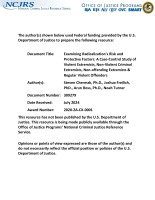Violent offenders
Race, Health, and Recidivism: Examining the Effects of Health Status and Healthcare Needs on Recidivism for Black and White Formerly Incarcerated People
Longitudinal Study of Social and Biological Factors in Crime Executive Summary
Redefining the Career Criminal: Priority Prosecution of High-Rate Dangerous Offenders
Group Offending and Criminal Careers: Violence Among Juvenile Delinquents and Adult Offenders, Final Report
At Risk of Rearrest for a Violent Crime: Predicting High- Stakes, High-Speed Recidivism; Developing Prediction Models in Two Birth Cohorts
Patterns of Violent Crime: A Longitudinal Investigation
Sentencing Guidelines: Their Effect in Minnesota
Disturbed Violent Offender, Final Report
PAROLE VIOLATION PATTERNS AND COMMITMENT OFFENSE
Neuropsychology, Neuroscience, Volitional Impairment and Sexually Violent Predators: A Review of the Literature and the Law and Their Application to Civil Commitment Proceedings
ASSAULTIVE YOUTH - AN EXPLORATORY STUDY OF THE ASSAULTIVE EXPERIENCE AND ASSAULTIVE POTENTIAL OF CALIFORNIA YOUTH AUTHORITY WARDS
Examining Radicalization's Risk and Protective Factors: A Case-Control Study of Violent Extremists, Non-Violent Criminal Extremists, Non-offending Extremists & Regular Violent Offenders
Practices and Needs in Reintegration Programs for Violent Extremist Offenders in the United States: The Extremist Perspective
Lessons of an Honor Code: A Consideration of Conflict-Related Processes and Interpersonal Violence
The Influence of Familial Social Support on Physical Health During Reentry
Shared Struggles? Cumulative Strain Theory and Public Mass Murderers From 1990 to 2014
Punishing the Wicked: Examining the Correlates of Sentence Severity for Convicted Sex Offenders
A 28-year longitudinal study of victimization and perpetration of violence in high-risk youth: Advancing the development of preventive interventions in the community
A multilevel analysis of juvenile life without parole and its reform: understanding the people, places, and politics that shape policy.
What Works to Reduce Violent Gun Crime in Focused Deterrence Initiatives? Estimating the Effect of Services and Enforcement in Facilitating Desistence Among Prolific Violent Offenders
Meeting People Where They Are to Improve Institutional Culture
Incarcerated individuals deserve opportunities for healing and growth, but they often lack the necessary resources for such opportunities. Additionally, organizational cultures that don’t support these outcomes often stand in the way. Researchers and practitioners gathered at NIJ’s 2023 National Research Conference to share ideas and projects that will increase opportunities for incarcerated populations around the country. This show continues their conversation.




